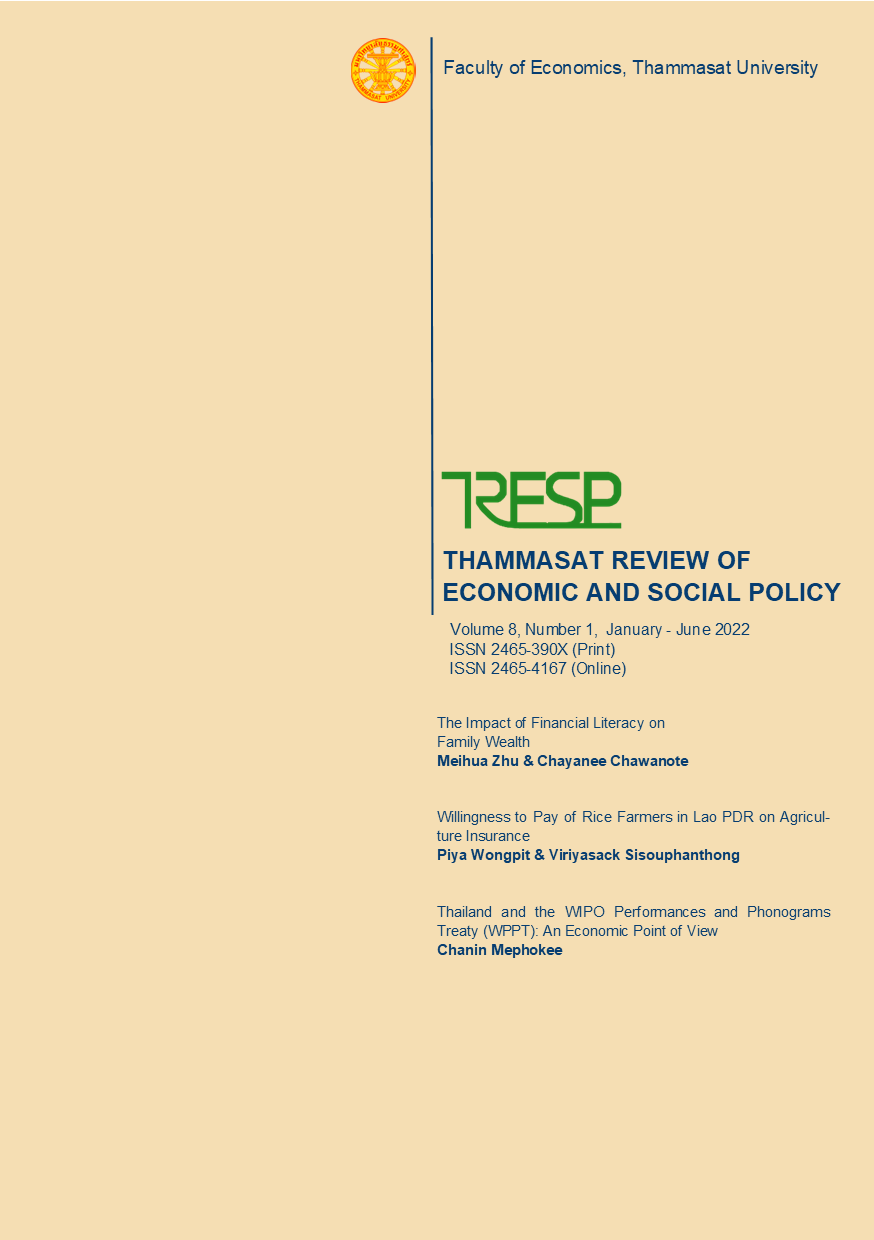Thailand and the WIPO Performances and Phonograms Treaty (WPPT): An Economic Point of View
Abstract
This paper attempts to investigate the current situation in the film and music industries in Thailand, especially, the problems of Thai performers and whether joining The WIPO Performances and Phonograms Treaty (WPPT) would solve the performers’ problems. Performer rights may be just one issue in this industry, the entertainment industry is facing high financial risks, a small domestic market, and the monopoly power of the big players in the industry. The low bargaining power of lesser-known performers may not be a result of the country’s copyright issue but in a huge part due to the monopoly structure of the market. Becoming a party of the WPPT may provide a net benefit to Thailand while the administrative costs to revise the Act may be minimal. However, some may be concerned that Thailand is a net importer of performances, and any benefits arising from the extension of rights could simply flow overseas rather than to Thailand. The extension of performers’ rights would not necessarily result in increased or better performances, as performers appear to have a range of other incentives that courage performance. These include incentives that are not primarily economic.
References
Chaowalit, P., “Unfair Contract Terms in Actor’s Contract”, Master Thesis, Faculty of Law, Thammasat University, 2015 (in Thai)
International Bureau,” The Advantages of Adherence to the WIPO Copyright Treaty (WCT) and the WIPO Performances and Phonograms Treaty (WPPT)”, document prepare for WIPO., www, WIPO. Int
La Torre M., The Economics of the Audiovisual Industry: Financing TV, Film and Web, 2014
Lopattanonont, T., Voraluk, K., and Thaweekul, S., “Coherence of Thai Film Industry and Thailand’s Strategies of Film and Video Promotion, Phase II ((2017-2021), Research Paper, Dhurakit Pandit University, 2020
Ministry of Finance, WIPO Performances and Phonograms Treaty: National Interest Analysis, New Zealand, mfat.govt.NZ., 2016
Oxford Economics, The Economic Contribution of the Film and Television Industries in Thailand, www.mpa-apac.org, 2012
Supsinwiwat, Nathita, “Music Industry in Thailand 4.0”, Journal of Social Media Innovation, Vol. 1(9), pp. 157-167, 2017 (in Thai)
Tavornvanit and Chinsuwapara, “Intellectual Property Rights Protection: A Case Study of Infringement on Movie Copyrights in Thailand”, Kasem Bundit Journal, October, pp. 60-71, 2020 (in Thai)
Tay, En-Yen, “Collective Management of Musical Copyright in Self-Regulated Regime”, Singapore Academy of Law Journal, e-First, 23 June 2020.
Turner, G., Understanding Celebrity, Sage Publications, London, 2004
Wongsuesat, P., “Performers’ Right Protection under the Beijing Treaty on Audiovisual Performances of the World Intellectual Property Organization”, Master Thesis submitted to Graduate School, Faculty of Law, Bangkok University, 2014 (in Thai)
World Intellectual Property (WIPO) Intellectual Property Handbook [ISBN 978-92-805-1291-5]: https://www.wipo.int/edocs/pubdocs/en/intproperty/489/wipo_pub_489.pdf?msclkid=071ab1f8bbec11eca0a5740d1220b3c4 (last visit: 14/4/2022)
Wuttipong, Nalin, “The Thai Popular Music Industry: Industrial Form and Musical Design”, thesis submitted to the University of Nottingham for the degree of Doctor of Philosophy, September 2011
Downloads
Published
How to Cite
Issue
Section
License
Copyright (c) 2022 Thammasat Review of Economic and Social Policy

This work is licensed under a Creative Commons Attribution-NonCommercial-NoDerivatives 4.0 International License.



